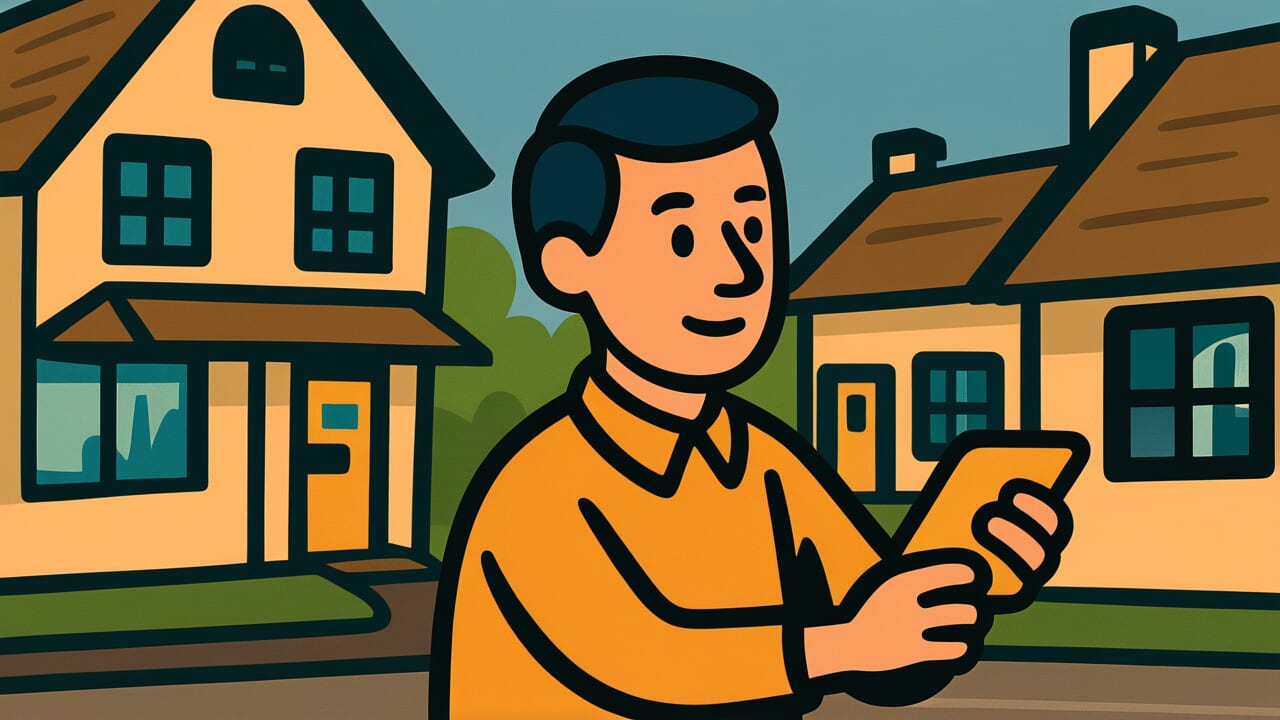How to Read “Choose not the house but the neighbor”
Taku wo boku sezu tonari wo boku su
Meaning of “Choose not the house but the neighbor”
This proverb teaches that the character of your neighbors matters more than the quality of the location where you build your home.
Even if a place has great sunlight and convenient transportation, your daily life will be difficult if your relationship with neighbors is bad.
On the other hand, even if the land conditions are somewhat inferior, you can live peacefully by helping each other when blessed with thoughtful, good neighbors.
This proverb is used when moving or building a house. It reminds us what truly matters when we tend to focus only on location and building features.
In modern times, neighborhood relationships have become less common. However, good relationships with neighbors still greatly affect quality of life.
This shows in mutual help during disasters and small daily troubles.
Origin and Etymology
This proverb is believed to originate from ancient Chinese classics.
The character “卜” (boku) comes from ancient Chinese divination practices. People burned turtle shells or animal bones to tell fortunes.
This character means “to divine” or “to choose.” So “宅を卜す” means to divine and choose a place to build a house.
“隣を卜す” means to divine and choose neighbors.
Confucian thought in China placed great importance on harmony in human relationships. No matter how splendid your house, daily life becomes painful if relationships with neighbors are bad.
Conversely, even if your house is modest, you can live a spiritually rich life when blessed with good neighbors.
This life wisdom is condensed in this proverb.
It has been passed down in Japan since ancient times. It appears in Edo period literature, showing it has been inherited as a life guideline for many years.
By expressing this through the sacred act of divination, it emphasizes how important choosing neighbors is.
This proverb strongly reflects Eastern values that prize the quality of human relationships over material wealth.
Usage Examples
- If you’re looking for a new home, “Choose not the house but the neighbor,” so let’s go check out the neighborhood atmosphere first
- It’s a property with good conditions, but they say “Choose not the house but the neighbor,” so I want to check out the residents too
Universal Wisdom
Humans cannot live alone. This proverb has been passed down for hundreds of years because we tend to forget this simple truth.
We tend to place value on visible things. Spacious land, impressive buildings, convenient locations. These are certainly important.
However, relationships with neighbors you see every day are actually the biggest factor affecting daily happiness, even though they’re less visible.
As a human essence, we seek to be recognized, respected, and needed. Good neighbor relationships fulfill precisely this fundamental desire.
A morning greeting, a brief chat, helping each other in times of trouble. These casual exchanges give our hearts a sense of security and belonging.
This proverb also touches on the essence of human sociability. No matter how materially blessed you are, you cannot feel happy if isolated.
Conversely, even with few possessions, your heart is fulfilled when surrounded by warm human relationships.
Our ancestors deeply understood from experience that the essence of happiness lies in human connections.
This is timeless wisdom that teaches us what to prioritize in the major life decision of choosing where to live.
When AI Hears This
This proverb about prioritizing neighbors over impressive buildings actually strikes at the core of network theory.
Sociologist Granovetter discovered a phenomenon called “the strength of weak ties.” His research showed that about 84% of people who successfully changed jobs got their information from “occasional acquaintances” rather than close friends.
In other words, moderately distant relationships have a higher probability of bringing new information and opportunities than intimate relationships.
Neighbors are typical examples of these “weak ties.” They’re not as close as family, but physical proximity creates regular contact.
This relationship functions as “bridging capital” in social capital theory. In other words, it becomes a connection point to people with different occupations, ages, and values from yourself.
Even living in a splendid house, no information or opportunities come if you’re isolated. Conversely, even in an ordinary house, surrounded by diverse neighbors, it becomes a valuable network node.
What’s interesting is that this proverb places human relationships above real estate, a “non-depreciating asset.”
Modern research also shows that places with strong local social connections have lower crime rates, longer healthy life expectancy, and higher economic resilience.
The value of a physical place is actually determined by the quality of the human network that gathers there.
Lessons for Today
In modern society, it’s normal to search property information on smartphones when choosing a home. We filter by quantifiable conditions like floor plans, distance from stations, and rent.
However, this proverb poses an important question to us. What truly creates a happy life?
When you place yourself in a new environment, first turn your attention to the people around you.
When choosing a workplace or school, try to sense what kind of people are there. The atmosphere, people’s expressions, the warmth of communication.
Things that don’t appear in numbers but greatly affect daily life exist there.
And this proverb teaches us one more important thing. If you want to be blessed with good neighbors, first become a good neighbor yourself.
Greet people, call out to those in trouble, maintain appropriate distance while having compassion.
The relationships you create determine the quality of the world you live in.
Happiness doesn’t exist inside impressive buildings. It’s born between people.



Comments